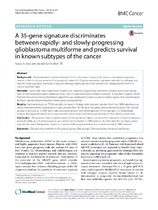A 35-gene signature discriminates between rapidly- and slowly-progressing glioblastoma multiforme and predicts survival in known subtypes of the cancer
Abstract
BACKGROUND: Gene expression can be employed for the discovery of prognostic gene or multigene signatures
cancer. In this study, we assessed the prognostic value of a 35-gene expression signature selected by pathway and
machine learning based methods in adjuvant therapy-linked glioblastoma multiforme (GBM) patients from the
Cancer Genome Atlas.
METHODS: Genes with high expression variance was subjected to pathway enrichment analysis and those having
roles in chemoradioresistance pathways were used in expression-based feature selection. A modified Support Vector
Machine Recursive Feature Elimination algorithm was employed to select a subset of these genes that discriminated
between rapidly-progressing and slowly-progressing patients.
RESULTS: Survival analysis on TCGA samples not used in feature selection and samples from four GBM subclasses, as
well as from an entirely independent study, showed that the 35-gene signature discriminated between the survival
groups in all cases (p < 0.05) and could accurately predict survival irrespective of the subtype. In a multivariate
analysis, the signature predicted progression-free and overall survival independently of other factors considered.
CONCLUSION: We propose that the performance of the signature makes it an attractive candidate for further studies to
assess its utility as a clinical prognostic and predictive biomarker in GBM patients. Additionally, the signature genes
may also be useful therapeutic targets to improve both progression-free and overall survival in GBM patients.

